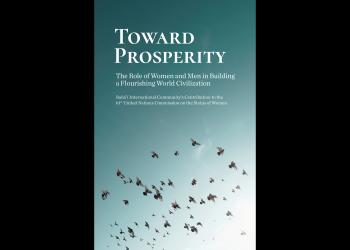Exploring the connection between women’s equality and economic prosperity
The connection between inequalities faced by women in the workplace and the often “deeply dysfunctional” global economic system is analyzed in the Baha'i International Community’s statement this year to the UN Commission on the Status of Women.
“Significant advances have been made in terms of educational access and the creation of environments for women to thrive alongside men; nevertheless, far more remains to be accomplished,” says the statement.
“Systemic and structural injustice continues to suppress women’s potential, plunging humanity into crisis after crisis. Until these inequalities are thoroughly uprooted from the fabric of society, humanity will remain mired in the conflict, despair, confusion, and imbalance that have come to define much of modern life,” says the statement.
Titled “Toward Prosperity: The Role of Women and Men in Building a Flourishing World Civilization,” the statement goes on to explore how new, more equal and more value-oriented education systems, which address such imbalances at an early age, can help rectify the inequalities that exist between women and men – and to create a more prosperous system for all.
“Education must be comprehensive, addressing their burgeoning spiritual, physical, and intellectual powers,” said the statement, referring to the importance of helping young people understand their role in society.
“A key principle that must be taught from an early age is the oneness of humanity. Within this, the equality of women and men should be emphasized.”
The full statement, which seeks to address the Commission’s priority theme this year of “Women’s economic empowerment in the changing world of work,” can be read here.
In other contributions to the 61st CSW, which will be held 13-24 March 2017, the BIC plans to offer a number of parallel events exploring the themes of the statement and other issues before the Commission. All scheduled to be held at the offices of the Baha'i International Community in New York, these events include:
-
A lunch time event exploring BIC’s statement to the Commission. Scheduled for Wednesday, 15 March, from 1:15 to 2:45 pm, the event will seek to solicit responses to the statement while also allowing participants to share their own perspectives.
-
A youth and gender equality event, scheduled also on Wednesday, 15 March at the BIC but from 3:30 to 5 pm. The event aims to build on the conversations and relationships developed at the CSW Youth Forum by having an informal discussion on youth, work, employment and purpose.
- The screening of a film, Mercy’s Blessing, on Friday, 17 March, from 1:15 to 2:45 pm. Inspired by true events, the film examines issues of child marriage, the education of the girl child, and gender equality in Malawi, as seen through the eyes of a teenage boy who hopes to raise his younger sister and himself out of poverty. The director, May Taherzadeh, will be present and a discussion will follow. The event is co-hosted by the Mission of Malawi to the UN.
The BIC will also host two events of the Faith and Feminism Working Group to the UN.
-
On Tuesday, 14 March, from 1:15 to 2:45, the FaithFem Working Group will discuss its statement to the CSW, which is titled “Re-conceptualizing Women and Girls Economic Empowerment through a Feminist Spiritual Perspective.” The event will include an introduction to the Group and breakout discussion sessions.
- On Thursday, 16 March, from 1:15 to 2:45 pm, there will be a “Strategy and Advocacy Roundtable” of the FaithFem Working Group, at which participants, along with key actors, will discuss advocacy, strategy, and opportunities for collaboration on faith and feminism issues at the UN.
“Every year the CSW brings together thousands of women from around the world to discuss issues of gender inequality and women’s advancement,” said Saphira Rameshfar, a representative of the Baha'i International Community to the United Nations.
“Our contributions this year are designed to encourage a broader conversation about how existing inequalities impact not only women but also the world as a whole, in that by holding back the empowerment of women, we are limiting the prosperity of all,” she said.
